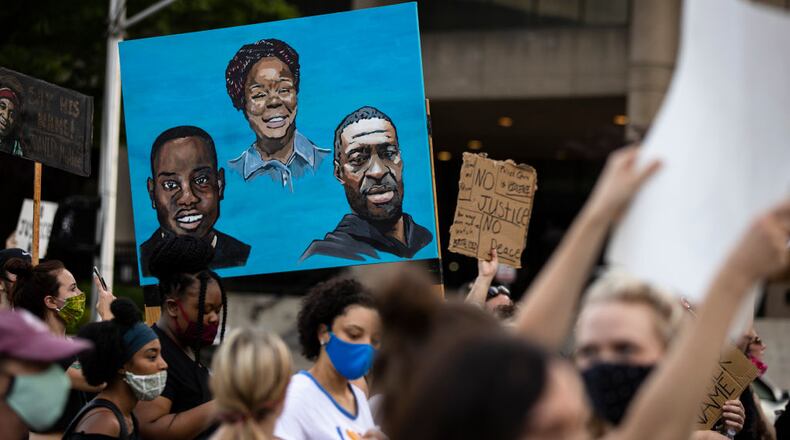I am so tired of people saying sorry.
Sorry for what happened to George Floyd, Ahmaud Arbery and Breonna Taylor, among others.
Sorry about the racism I’ve had to endure in my life, including in the Dayton area.
Sorry that racism still exists.
You can keep your sorry.
I mean, the sentiment is nice and all, but sorry doesn’t result in systematic change.
Sorry does not lift that knee from Floyd’s neck.
If you don’t understand that racism is still a pervasive problem, you’re thinking about the problem wrong. Most look at racism in terms of years.
>> Join the community conversation about combating racism with Big Read project and talk
It’s been 155 years since the slaves were freed in 1865. That’s a long time.
Sorry, but no, it’s not.
Years can’t magically remove racism’s stain when the scourge has been passed down through generations. When you look at racism in terms of generations, we’re still in the beginning stage of tackling this injustice.
It’s been a little more than five generations since we freed the slaves.
My grandmother’s grandmother was a slave.
Think about that.
It’s only been four generations since the Supreme Court legalized segregation in 1896 in Plessy vs. Ferguson. It’s been just two generations since the court outlawed segregation in schools with its 1954 Brown v. Board of Education decision.
A lot of hate can be passed down from generation to generation.
So instead of saying sorry, what can you do to make a real difference?
• Become aware. Understand that in 2020 we have a class of people who are still treated differently based on race. Acknowledge you’re not fully aware of the extent your coworkers, friends and neighbors are treated differently based on the color and the damage that does to them and their families.
• Engage: Earnestly engage in a deep conversation with someone of color and learn about their experiences. Learn about what it’s like to fear leaving a grocery store without a receipt, or to learn not stand behind a white woman in an empty elevator. Society focuses on what I call big picture racism (housing and loan denials, etc.) but there are a whole host of issues that can crush a black person’s self-esteem. Ask yourself: Have I ever contributed to that?
• Act: Ask you neighbors, civic group, PTO, et al, to have a honest discussion about race. Who has formed opinions based on look, hair, dress, or how someone talks? How would you feel if your daughter dated a black guy? Have you ever thought “thug” in relation to a black person?
Don’t say “sorry.” Become aware, engage, and act.
Ray Marcano, a former Dayton Daily News editor, is a media lecturer at Wright State. He’s the former national president of the Society of Professional Journalist, a two-time Pulitzer juror and a Fulbright fellow.
Dayton Metro Library is offering a community-wide Big Read of the book “Me and White Supremacy: Combat Racism, Change the World and Become a Good Ancestor” by Layla Saad.
The Dayton Daily News and library will host a panel discussion, live-streamed on Facebook, on Wednesday, July 8, from 5 to 6 p.m.
The discussion will be moderated by Amelia Robinson, the newspaper’s community impact editor.
Panelists are: Debbie Feldman (president and CEO, Dayton Children’s Hospital), Shannon Isom (president and CEO, YWCA Dayton), Kevin M. Kelly (executive director, Dayton International Peace Museum) and Brian O. Martin (executive director, Miami Valley Regional Planning Commission).
About the Author

